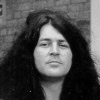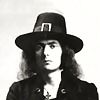|
Maybe you could send me a couple to put with the interview... We could make them a little blurry... Speaking of pictures, what happened with the Machine Head t-shirt logo? There was a rumour...  Ian Gillan: They are too pornographic (laughs)..... When you're in Deep Purple, you're in Deep Purple, you sign up etc. Now, Ritchie was getting paid, he got paid for everything and sometimes he got paid more than any other people. He got his lawyer to say to Bruce Payne "You can't use my image on the Machine Head, I don't wanna be on it". So, Bruce said "Ok, so we just blur his face so he's no longer". That's what he asked for. So, then, Ritchie started suing Bruce, cause he was angry and I think it's been tried at the court several times. Well, it's his naked mother in law who probably did it. I don't think that Ritchie actually even knew about it.
Ian Gillan: They are too pornographic (laughs)..... When you're in Deep Purple, you're in Deep Purple, you sign up etc. Now, Ritchie was getting paid, he got paid for everything and sometimes he got paid more than any other people. He got his lawyer to say to Bruce Payne "You can't use my image on the Machine Head, I don't wanna be on it". So, Bruce said "Ok, so we just blur his face so he's no longer". That's what he asked for. So, then, Ritchie started suing Bruce, cause he was angry and I think it's been tried at the court several times. Well, it's his naked mother in law who probably did it. I don't think that Ritchie actually even knew about it.Rock Pages.gr, October 2008 We all got back together and it was a great feeling at the time, and when Ritchie left, that nearly killed us.....  Ian Gillan: I spoke with Bruce Payne (Deep Purple manager) in a dressing room in Helsinki and told a couple of stories about what had happened to Ritchie and Deep Purple... When I came back in the band, the record company said we gonna cancel the contract if we don't get Ian back in. Ritchie refused. The rest of the guys said, "Yeah, we made a mistake". So, Ritchie refused and insisted on a payment of a quarter of a million dollars directly into his bank account, non returnable, to work with me. The other guys didn't know that. They didn't get any money. Nothing. The record company paid him on condition to make the record and a minimum one year tour. And of course he didn't. We did the record and only half a tour. And in the dressing room, in Helsinki, there were tears, some people were crying, it's like somebody in the town has died or your parents are getting divorced. It was horrible and nobody could see the future until Bruce told this story about Ritchie and Jon Lord looked up and said "What!?" and Paice said "What!?" and Roger said "You must be joking..."
Ian Gillan: I spoke with Bruce Payne (Deep Purple manager) in a dressing room in Helsinki and told a couple of stories about what had happened to Ritchie and Deep Purple... When I came back in the band, the record company said we gonna cancel the contract if we don't get Ian back in. Ritchie refused. The rest of the guys said, "Yeah, we made a mistake". So, Ritchie refused and insisted on a payment of a quarter of a million dollars directly into his bank account, non returnable, to work with me. The other guys didn't know that. They didn't get any money. Nothing. The record company paid him on condition to make the record and a minimum one year tour. And of course he didn't. We did the record and only half a tour. And in the dressing room, in Helsinki, there were tears, some people were crying, it's like somebody in the town has died or your parents are getting divorced. It was horrible and nobody could see the future until Bruce told this story about Ritchie and Jon Lord looked up and said "What!?" and Paice said "What!?" and Roger said "You must be joking..."Rock Pages.gr, October 2008 As he started to develop a reputation as a notable guitarist, Satriani was faced with a dilemma - when Ritchie Blackmore left Deep Purple, the band asked him to become a full-time member. It was a difficult decision.  Joe Satriani: They were, and are, a great band and at the time they were a fully functional rocking unit, but at the time I was a solo artist and people liked what I did. If I joined, I'd have to tone down that side of things to become a member of Purple in order to give them the time and respect they deserved and I wasnt really ready to do that. And, of course, I was worried about having Ritchie Blackmore on my shoulder. I was and still am a great fan of his playing and you can't really replace someone like him.
Joe Satriani: They were, and are, a great band and at the time they were a fully functional rocking unit, but at the time I was a solo artist and people liked what I did. If I joined, I'd have to tone down that side of things to become a member of Purple in order to give them the time and respect they deserved and I wasnt really ready to do that. And, of course, I was worried about having Ritchie Blackmore on my shoulder. I was and still am a great fan of his playing and you can't really replace someone like him.Since turning it down, I talked with Steve Vai about it and Steve made a career of stepping into other people's shoes and he said 'Joe, if you can avoid it, never get into a situation where you're replacing someone famous, as the fans, the journalists, are always watching you and comparing you to the other guy'. So it looks like it was the right choice. I just wasn't the guy that was meant to join Deep Purple. This is Nottingham, Evening Post, March 28, 2008 How would you describe your relationship with Ritchie Blackmore back in Deep Purple?  Glenn Hughes: You know, you can ask anyone who's worked with Ritchie — it's kind of difficult to have one. I think Ritchie Blackmore is a very talented guy, but I don't think he's a very approachable guy in a band situation. I think Ritchie Blackmore is the kind of cat that when you look back on 1968 to 1976, you think there's a great, great musician. But, it's like we don't know who he is because you're not allowed to find out. I come from a long line of caring, nurturing people. I'm very much a giver and I'm a very humble guy. And Ritchie is a guy that sort of likes to have that edge, you know. Ritchie and I started off very well. We flew off to Hamburg and stayed up all night drinking for three nights. We bonded together. And then we did really well when we made Burn.
Glenn Hughes: You know, you can ask anyone who's worked with Ritchie — it's kind of difficult to have one. I think Ritchie Blackmore is a very talented guy, but I don't think he's a very approachable guy in a band situation. I think Ritchie Blackmore is the kind of cat that when you look back on 1968 to 1976, you think there's a great, great musician. But, it's like we don't know who he is because you're not allowed to find out. I come from a long line of caring, nurturing people. I'm very much a giver and I'm a very humble guy. And Ritchie is a guy that sort of likes to have that edge, you know. Ritchie and I started off very well. We flew off to Hamburg and stayed up all night drinking for three nights. We bonded together. And then we did really well when we made Burn.But as soon as we hit the stage for the first time, a line was drawn in the sand. You weren't supposed to go over to his side of the stage; you weren't supposed to interact with him because it was "his" thing. I'm very much an inter-actor. I like to get involved with people on stage. If you look at Deep Purple footage before me and Coverdale, there's five guys on the stage and no interaction at all. I sort of brought that out in the band. If you look at the California Jam video, I interacted with each member. I tried to do that with Ritchie, but it was difficult. Vintage Rock.com, March 2008 Ritchie Blackmore about Jimmy Page in Classic Rock Magazine Special Collector's Edition  Ritchie Blackmore: As I've said before, Jimmy Page has an incredible overview of what's going on within the context of a band. He doesn't just play a solo as most guitar players do. He hears the whole arrangement of the song and incorporates a lot of colour with a producer like awareness. So with Led Zeppelin he is a producer as well as a songwriter as well as a stage performer - and as well as a guitarist. I'm glad to see that Jimmy Page has made a big name for himself, as he is one of the greatest talent around.
Ritchie Blackmore: As I've said before, Jimmy Page has an incredible overview of what's going on within the context of a band. He doesn't just play a solo as most guitar players do. He hears the whole arrangement of the song and incorporates a lot of colour with a producer like awareness. So with Led Zeppelin he is a producer as well as a songwriter as well as a stage performer - and as well as a guitarist. I'm glad to see that Jimmy Page has made a big name for himself, as he is one of the greatest talent around.High Voltage Rock'n'Roll, Classic Rock Magazine, December 2007 Ritchie Blackmore about Physical Graffiti in Classic Rock Magazine Special Collector's Edition  Ritchie Blackmore: 'Kashmir' and 'When The Levee Breaks' were probably my favorite Led Zeppelin songs. 'Kashmir' inspired me to write 'Stargazer' for Rainbow incorporating the Turkish element.
Ritchie Blackmore: 'Kashmir' and 'When The Levee Breaks' were probably my favorite Led Zeppelin songs. 'Kashmir' inspired me to write 'Stargazer' for Rainbow incorporating the Turkish element.High Voltage Rock'n'Roll, Classic Rock Magazine, December 2007 Under the moniker of Rainbow Revisited, Classic Rock released a DVD in 2005 of a live concert Doogie White did in November 2004 with a band called White Noise. The band featured beside Doogie White members of Mostly Autumn.  Doogie White: I was and remain extremely disappointed in the White Noise DVD. When I got the rushes through of the first edit, I had some changes I wanted to make including a total remix of the sound which was woeful. As it turns out this was the FINAL cut, edit and mix. It remains a low point for me as the show was better than the DVD illustrates. The sound appears to be a direct feed from the mixing board and the promise of bonus material was misleading to say the least. All in all a most unsatisfactory way to represent the hard work and effort the Mostly Autumn band and crew put in.
Doogie White: I was and remain extremely disappointed in the White Noise DVD. When I got the rushes through of the first edit, I had some changes I wanted to make including a total remix of the sound which was woeful. As it turns out this was the FINAL cut, edit and mix. It remains a low point for me as the show was better than the DVD illustrates. The sound appears to be a direct feed from the mixing board and the promise of bonus material was misleading to say the least. All in all a most unsatisfactory way to represent the hard work and effort the Mostly Autumn band and crew put in.Incidently when I was approached originally about the tour I wanted to have Cornerstone involved but the promoter, or whoever nixed that and wanted MA and the SIUA tracks. The DVD has a bit of a Dalek about it in that I have seen it once and hid behind the sofa in abject terror. It is truely shocking and that is why I have done nothing to advertise nor promote this. Deep Purple Fan Forum, January 2008 I absolutely love "Ariel". Can you tell us about that song?  Candice Night: "Ariel", believe it or not was the very first song that Ritchie and I ever wrote together. I kind of wanted it to be about this very ethereal woman, kind of like Stevie Nick's Rhiannon. It was before Blackmore's Night ever existed. It was right after Ritchie left Deep Purple for the last time -well, that we know of- in 1993, just stepped off tour, and he reformed Rainbow. In 1995, they put out the album, Stranger in Us All, the lyricist-slash-singer at that point, Scottish guy, Doogie White, he had written the lyrics for probably about 5 songs then, about drinking and fighting (laughs) and women leaving him, so after five songs of that they said, we need fresh ideas. Ritchie said to me, well what do you think if I give them "Ariel"? Well you know at this point we weren't in Blackmore's Night. So at this point for me, it was just like: "Wow, that would be amazing. It would be great. I'd love to hear how it sounds when you guys bring that rock and roll stuff into it, so let's see how it goes." And they did, and they came up with their version of "Ariel" which was much harder. It sounds like I'm talking about a child (laughs) I'm so proud of her.
Candice Night: "Ariel", believe it or not was the very first song that Ritchie and I ever wrote together. I kind of wanted it to be about this very ethereal woman, kind of like Stevie Nick's Rhiannon. It was before Blackmore's Night ever existed. It was right after Ritchie left Deep Purple for the last time -well, that we know of- in 1993, just stepped off tour, and he reformed Rainbow. In 1995, they put out the album, Stranger in Us All, the lyricist-slash-singer at that point, Scottish guy, Doogie White, he had written the lyrics for probably about 5 songs then, about drinking and fighting (laughs) and women leaving him, so after five songs of that they said, we need fresh ideas. Ritchie said to me, well what do you think if I give them "Ariel"? Well you know at this point we weren't in Blackmore's Night. So at this point for me, it was just like: "Wow, that would be amazing. It would be great. I'd love to hear how it sounds when you guys bring that rock and roll stuff into it, so let's see how it goes." And they did, and they came up with their version of "Ariel" which was much harder. It sounds like I'm talking about a child (laughs) I'm so proud of her.Morley Seaver, Anti Music, December 2007 [For the full interview click here] At the time when you guys started the band there were a lot of Purple and Rainbow fans who thought Ritchie had met this young hot blonde and she was not letting him play rock music anymore.  Candice Night: Oh yeah, that's right, I'm the Yoko Ono of the group. I love those people who think they know everything and throw rotten tomatoes at you. Ritchie has to follow his own path and his own heart. If he wanted to do something else then he would do it. Nobody shackles him in anything. He does what he wants to do and he always has done that.
Candice Night: Oh yeah, that's right, I'm the Yoko Ono of the group. I love those people who think they know everything and throw rotten tomatoes at you. Ritchie has to follow his own path and his own heart. If he wanted to do something else then he would do it. Nobody shackles him in anything. He does what he wants to do and he always has done that.Classic Rock Revisited, December 2007 [For the full interview click here] I was watching the Paris Moon DVD and I swear at one point I saw a guy in a bunny suit hop across the stage.  Candice Night: I hear about that hallucination quite often. I think the beauty of music is evoking the spirit of the bunny to hop across the stage. It is comic relief. He actually got that from Jethro Tull. Ritchie was very taken by them years ago when he saw them have people in bunny suits hopping across the stage.
Candice Night: I hear about that hallucination quite often. I think the beauty of music is evoking the spirit of the bunny to hop across the stage. It is comic relief. He actually got that from Jethro Tull. Ritchie was very taken by them years ago when he saw them have people in bunny suits hopping across the stage.Classic Rock Revisited, December 2007 |